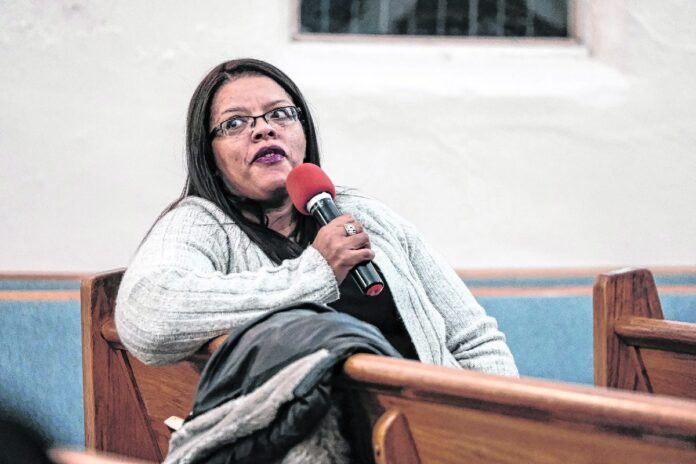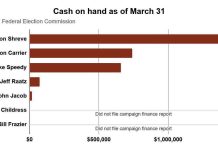
COLUMBUS, Ind. — Following the recent Capitol insurrection, some members of the community are wondering if like-minded individuals might also be found a little closer to home — possibly in local law enforcement agencies.
Columbus Police Department Chief Mike Richardson fielded questions Thursday about how the city police department screens potential hires, during a meeting of the Community Police Review Board.
Board member Olisa Humes noted that there has recently been talk of “infiltration” in police departments around the nation and asked what steps the CPD takes in its screening process.
Background investigations are conducted on potential hires, Richardson said. This process includes looking at all of the person’s social media, looking at any groups he or she is involved in, administering a polygraph test and more, he said. The process may include family, friends, coworkers and individuals who were previously involved with the job candidate.
“Obviously, you get a list of references, but we’re going to talk to a lot more people than just the ones you want us to talk to,” Richardson said.
In regards to the social media check, an investigator will request that the individual log into their social media accounts so that the investigator can look through it.
Richardson did say that if a person is aware of the process ahead of time, it’s possible that they could work to hide aspects of their social media by using different names or other means. He said that’s why the polygraph test is also used. As part of the test, individuals are asked if they’re involved in certain types of groups, though Richardson did not state which specific groups or movements are included in this question.
Richardson was also asked if there is screening for current members of the department.
“On a continuum basis, how do you weed out people that are currently in the force, who may have evolved and have changed their ideology and … who are now part of white supremacist groups?” Humes asked.
Richardson said he believes that other CPD officers would know if those ideologies were being represented or supported by an individual.
“We’re not like Indianapolis, Louisville, Chicago, cities,” he said. “… We’re sort of like a small community, where you know a lot of other people’s business.”
Most CPD officers tend to be friends with each other, as well as with their supervisors, on social media and are able to see each other’s posts and who they communicate with. So if they see something “questionable,” he believes they would make the the department aware of it.
In one instance, an officer posted something sarcastic on social media to the effect of “I’m not here to babysit your kids.”
Richardson said this matter was dealt with on the same day.
“That came to our attention immediately,” he said. “A supervisor found out about it and dealt with it before the shift. They found out about it, they called that person in as soon as they came to work, and that post was taken off of their social media immediately. And they were written up for that.”
CPD occasionally gets emails or phone calls about officers or the things they’ve posted, he said.
Humes expressed some concern about relying on officers to report each other.
“We would hope that they would want everybody to do the right thing and everybody does the right thing, but … that’s not how it happens in several of the scenarios,” she said.
Humes said that she would like there to be a plan in place. She asked if there’s someone who goes through officers’ social media every so often in unannounced checks — not with password access, but by looking through their posts.
Richardson noted that officers “still have some rights.”
“I’m not saying that we violate their freedom of speech, but … there are red flags sometimes that we miss them because we’re not paying attention,” Humes said.
Columbus Human Rights Commission director Aida Ramirez told the review board that several people have reached out to the commission to express concern law enforcement’s role in the Capitol incident.
“Several people, for the last three weeks — more people than you would think — have reached out and said that it is deeply concerning, in a way that they cannot articulate, to find out that there are so many retired, former, current law enforcement, military, paramilitary involved in the D.C. riots,” she said.
This concern extends to people who attended a rally or were part of the “Stop the Steal” movement, she said. There’s a “real, complex sense of mortification” at the thought that someone from Columbus could be involved in such events or, even if they didn’t participate, might still be part of similar conversations or activities, she said.
“Even if they weren’t involved, because they’re smart, and they know that there would be consequences, is anyone doing anything like that?” she asked. “Are they posting on Reddit? Do they have Parler accounts? Were they involved in the Three Percenters or in the Oathkeepers, or in any of these other groups that are here in town? That’s really where this is coming from.”
In light of a recent threat analysis communication sent out by the Department of Homeland Security regarding white supremacists and domestic terrorists, commissioners are asking if the city has the ability to use stipulate that officers “won’t be a part of white supremacist organizations or things of that nature,” Ramirez said.
Richardson said that he would have to talk to human resources about this question.
“I know that, obviously, just because you’re an officer, you don’t give up all your rights,” he said. “… I’m not sure where that line is, as far as what we would come out and say.”
Richardson said that once hired, an individual is “probationary” for a year and is an at-will employee within that time. Once that person reaches the one year mark, he said, the employee receives protections from the state.
“Obviously, if they’re doing something illegal or there’s other violations and those things, then we can do it,” he added.
Tom Dell, who is the board’s city council liaison, said that the community police review board is also a means of dealing with officer misconduct.
“Usually, if a person is going to act out, they’re going to act out in their interactions with citizens in our community,” he said. “That’s going to get back by having complaints against that officer … that we’re going to have to investigate.”
However, both Dell and other members acknowledged that the board may need to work harder to build trust within the community so that people have confidence in the process and are more willing to come forward.




